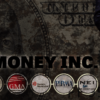Introduction

Update, Jan. 24, 2014, 12:14 p.m.: This story has been updated to include comment from Paul Breazeale, the treasurer of Mississippi 2012, who also provided a copy of the group’s 2012 tax return.
Corporate dollars have helped bankroll a host of political events and parties benefiting Democrats and Republicans alike, according to a Center for Public Integrity review of records voluntarily released by some of the nation’s largest companies.
For instance, records show New Orleans-based energy company Entergy Corp. donated $50,000 to Mississippi 2012, a nonprofit group established for “organizing, planning and implementing” activities related to the January 2012 inauguration of Republican Gov. Phil Bryant.
Mississippi 2012, which is organized under Sec. 501(c)(4) of the U.S. tax code as a social welfare nonprofit, is not required to publicly disclose its donors. The same rule applies to all 501(c)(4) nonprofits.
Tax records show Mississippi 2012 raised $507,500 in 2011 and $674,500 in 2012.
Like Entergy, tobacco giant Altria Group Inc. and drugmaker Eli Lilly & Co. both self-reported contributions to the nonprofit — giving $10,000 and $1,000, respectively.
In 2013, Eli Lilly also contributed to nonprofits linked to gubernatorial inauguration activities in Delaware and Washington state, according to company documents.
Paul Breazeale, the treasurer of Mississippi 2012, told the Center for Public Integrity that the nonprofit raised its funds from “a litany of people,” including “corporations and individuals.”
The state legislature did not appropriate money for the inaugural festivities, which included a parade, ball and bands, Breazeale continued. “Somebody’s got to pay for that stuff.”
Greg Kueterman, a spokesman for Eli Lilly, said the company doesn’t “elaborate on individual contributions.”
The company’s website states it is “committed to backing candidates of any party who support public policies that contribute to pharmaceutical innovation and the health needs of the patient.”
David Sutton, a spokesman for Altria, also declined to comment.
John Arledge, the vice president of public affairs for Entergy Mississippi, Inc., said that “there is little to no public funding of these statewide celebrations, so companies like ours are often asked to help support these events.”
“These contributions come from our company, not our customers,” he continued, adding that the company works with elected officials across the state to “promote positive growth and quality of life in the communities we serve.”
The Center for Public Integrity uncovered these donations as part of a comprehensive review of voluntary disclosures by companies that outlined their giving to politically active nonprofits and trade associations. This research revealed more than $185 million given to more than 1,000 nonprofits in a roughly one-year period around the 2012 election.
Other examples of corporations funding political conventions and inaugurations include Capital One Financial Corp. disclosing a $5,000 contribution to a politically involved nonprofit ahead of the 2012 Democratic National Convention in Charlotte.
The recipient of Capital One’s giving? The Minnesota-based Midwest National Convention Fund, which was designed to faciliate “the sharing of ideas between business, community and political leaders while enhancing Minnesota’s and the Midwest’s profile at the Democratic National Convention.”
The fund, which raised $151,000 during 2012, lists its president as Hubert H. “Buck” Humphrey IV, the grandson of former Democratic Vice President Hubert Humphrey.
That year, national Democrats broke with past policy and banned companies from directly contributing to the committee tasked with hosting the national convention. But corporate money still buoyed a related nonprofit that helped provide support for convention-related activities.
Meanwhile, oil company Phillips 66 self-reported a $10,000 contribution to a Florida-based group called Conventions 2012 LLC — money that was used to “support an event at the 2012 Republican National Convention,” according to Janet Grothe, a spokeswoman for Phillips 66.
The limited liability company touts its ability to help clients succeed “whether your goal is to connect with important decision makers, get the voters and the media to focus on your agenda or simply to host a great event with all the right people in attendance.”
It is connected to a trio of Republican political figures, including attorney Emmett “Bucky” Mitchell IV, according to state business records.
Sheila Krumholz, executive director of the nonpartisan Center for Responsive Politics, which tracks political fundraising, said such contributions may be attempts “to curry favor.”
“It’s a great way to increase the likelihood that they and their political agenda receive favorable consideration by those who control the levers of power,” Krumholz said.
Follow the corporate cash flow to nonprofits
About one-third of the 300 largest companies in the country voluntarily disclosed gifts to trade associations and other politically engaged nonprofits in 2012. We used those disclosures to make more than $173 million in previously dark money searchable.
Source: Center for Public Integrity review of corporate filings and IRS data
See something wrong or missing? Know of a company that discloses but is not on our list? Contact tips@publicintegity.org.
You can download and re-use this data, but please credit the Center for Public Integrity.
Julie Patel, Erin Quinn, Sarah Whitmire, Ben Wieder and Adam Wollner contributed to this database.
Editor’s note, Jan. 29, 2014, 5:15 p.m.: This item has been updated to reflect new data provided by Exelon Corp. Company officials now say the disclosures originally reviewed by the Center for Public Integrity contained inaccurate information, which caused about $13 million in payments to trade associations to be double-counted. See here for more.
Read more in Money and Democracy
Primary Source
Pro-Republican super PAC goes sour
Defunct Americans for Progressive Action received $1.7 million from winery executive
Primary Source
T-Mobile’s lobbying spending may be paying off
After its 2011 merger with AT&T was blocked, T-Mobile has boosted its lobbying to help it buy companies and frequencies



Join the conversation
Show Comments